The Hague, 25 October 2019 – The 29th Alzheimer Europe Conference (#29AEC) “Making valuable connections”, came to a close this evening, 25 October 2019, in The Hague. The focus of the final day was on dementia-inclusive societies and on dementia prevention.
Making our societies more dementia-inclusive
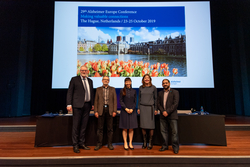 The third plenary session “Making our societies more dementia-inclusive” was chaired by Jim Pearson (Scotland, UK) and opened with a presentation by Bernd Heise, a member of the European Working Group of People with Dementia (EWGPWD), who shared his expectations from dementia-inclusive communities, with the audience. A dementia-friendly community, he said, may be built from several single initiatives, if they can work together towards a common goal. “Such communities are founded on the consensus of all responsible persons and on greater persistence”, he stressed. He also emphasised that a truly “dementia-friendly” community requires the full inclusion of people with dementia (hence the term “dementia-inclusive”) and must promote their existing skills and interests. The third plenary session “Making our societies more dementia-inclusive” was chaired by Jim Pearson (Scotland, UK) and opened with a presentation by Bernd Heise, a member of the European Working Group of People with Dementia (EWGPWD), who shared his expectations from dementia-inclusive communities, with the audience. A dementia-friendly community, he said, may be built from several single initiatives, if they can work together towards a common goal. “Such communities are founded on the consensus of all responsible persons and on greater persistence”, he stressed. He also emphasised that a truly “dementia-friendly” community requires the full inclusion of people with dementia (hence the term “dementia-inclusive”) and must promote their existing skills and interests.
Mohammed Akhlak Rauf, Founder & Director of Meri Yaadain CiC, used his presentation to discuss “Embedding intercultural care to support dementia care amongst minority ethnic communities”. He began by drawing attention to the impact that migration and migratory history have had on the level of trust accorded to statutory agencies. This lack of trust understandably reduces the uptake of health and social care services among migrants and people from minority ethnic communities, including those living with dementia. “Questions should be asked as to why minority ethnic groups are absent from services”, he urged. He also highlighted the importance of considering the needs of people with dementia and their family carers and of incorporating these into research, planning, design and delivery, from the off, rather than such supports being an “add-on” or an extra specialism, as is so often the case. In conclusion, Mohammed Akhlak Rauf stated that “understanding intercultural care needs requires an awareness of faith, language and wider cultural norms and how they influence conceptualisation as well as coping with dementia.”
Julie Meerveld, Manager of Regional Support and Advocacy at Alzheimer Nederland, presented “The Dutch National Programme for a dementia-inclusive society – a collaboration involving national and local authorities, associations and companies”. Alzheimer Nederland began its national campaign to make Dutch society more inclusive for people with dementia, in 2016, with the goal of educating the public about dementia and how to communicate better with people living with dementia. The campaign has been a success, she was pleased to say. After three years of campaigning, 80% of the public in the Netherlands is aware of the campaign, 280,000 people have signed up to support the campaign and 58% of those have completed training courses. 350 companies are also involved, training their employees and informing their customers. “It works. Dutch society has become a more dementia-friendly society, because the public and dementia friends feel more confident and able and family carers feel more supported and more able to ask for outside help”, she said. Alzheimer Nederland has been monitoring progress via panel consultation and research involving members of the public and informal carers. “Our three vital ingredients are: a large-scale scope of the campaign to create a responsive basis, close collaboration with companies and the twelve different online training courses and one offline training” she concluded.
Elina Suzuki, an Advisor to the Director of Employment, Labour and Social Affairs at the Organisation for Economic Co-operation and Development (OECD), was the final speaker at this plenary session. She presented on the state of dementia care and dementia-friendly initiatives across OECD countries. She reported that the quality of care for people living with dementia remains poor, even in many countries with strong health and social care systems. She also spoke about the rising interest in developing dementia-friendly initiatives in OECD countries, noting that at least 90% of OECD members reported having at least some dementia friendly initiatives in their countries.
How can research lead to better prevention?
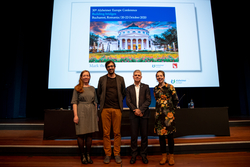 The last plenary session posed the question “How can research lead to better prevention?” and was chaired by Marco Blom (Netherlands). It began with a presentation on “Multidomain lifestyle interventions to prevent cognitive impairment and dementia: From FINGER to World-Wide FINGERS”, given by Tiia Ngandu, Research Manager and leader of the Dementia Prevention group at the Finnish Institute for Health and Welfare in Helsinki. She emphasised the importance of finding effective preventive interventions for dementia and Alzheimer’s disease (AD), given the growing number of cases, worldwide. The multifactorial etiology of dementia and late-onset AD mean that multi-domain interventions targeting several lifestyle-related and vascular risk factors are most likely to be effective, she said. “FINGER” is a pioneering trial providing the first evidence that a multi-domain lifestyle intervention may prevent cognitive impairment. The FINGER intervention, she commented, also has a beneficial effect on daily functioning, health-related quality-of-life and reduces the development of new chronic diseases. The implementation of the FINGER model in a public health context is ongoing and the FINGER model is being adapted and tested in new trials around the world, within the framework of “Word-Wide FINGERS” network. In closing, Tiia Ngandu urged all stakeholders to work together to promote better brain health and dementia prevention. The last plenary session posed the question “How can research lead to better prevention?” and was chaired by Marco Blom (Netherlands). It began with a presentation on “Multidomain lifestyle interventions to prevent cognitive impairment and dementia: From FINGER to World-Wide FINGERS”, given by Tiia Ngandu, Research Manager and leader of the Dementia Prevention group at the Finnish Institute for Health and Welfare in Helsinki. She emphasised the importance of finding effective preventive interventions for dementia and Alzheimer’s disease (AD), given the growing number of cases, worldwide. The multifactorial etiology of dementia and late-onset AD mean that multi-domain interventions targeting several lifestyle-related and vascular risk factors are most likely to be effective, she said. “FINGER” is a pioneering trial providing the first evidence that a multi-domain lifestyle intervention may prevent cognitive impairment. The FINGER intervention, she commented, also has a beneficial effect on daily functioning, health-related quality-of-life and reduces the development of new chronic diseases. The implementation of the FINGER model in a public health context is ongoing and the FINGER model is being adapted and tested in new trials around the world, within the framework of “Word-Wide FINGERS” network. In closing, Tiia Ngandu urged all stakeholders to work together to promote better brain health and dementia prevention.
Next, Meike Vernooij, Professor of Population Imaging at the Erasmus University Medical Center, discussed “The role of imaging in epidemiological studies: findings of the Rotterdam Scan Study”. She began by stating that the use of non-invasive imaging in population studies can help unravel preclinical brain changes in asymptomatic people, and as such can improve our understanding of the etiology of Alzheimer’s disease, as well as improving risk stratification and prediction of the disease. Besides informing researchers about (preclinical) disease, this so-called “population imaging” can also help us to better understand the (normal) brain ageing process, she said. This has value in clinical practice in the context of assessing whether an individual has brain tissue loss that is normal for their age. New advanced image processing methods that apply artificial intelligence techniques “may lead to detection of new biomarkers that may further improve risk prediction”, she told the audience. It is imperative, however, to keep in mind that the quality of data used will impact results, and therefore to be aware of how results have been generated.
Sebastian Köhler, Associated Professor at the School for Mental Health and Neuroscience at Maastricht University and Senior Researcher at the Alzheimer Centrum Limburg at Maastricht UMC+ used his session to stress the importance of immediate action, where dementia prevention is concerned. “Our own research shows that most people think dementia is inevitable. We need to inform the public better about what can be done to reduce the risk and create awareness”, he urged. There is consistent evidence that several lifestyle factors improve brain health later in life, he said, and that, while there is currently no sure way of predicting who will or will not develop dementia and that a healthy lifestyle is not a guarantee, it does lower the risk. In conclusion, he said that without a game-changing drug, which has not yet materialised, promoting a brain-healthy lifestyle is “the best and only the only option we have.”
Empowerment and wellbeing among people with dementia
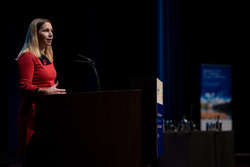 The keynote presentation was delivered by Debby Gerritsen, Professor of Wellbeing among Frail Elderly People and People with Chronic Illnesses in Long-term Care, at the Department of Primary and Community care of the Radboud University Medical Center in Nijmegen. Her presentation, “Empowerment and wellbeing among people with dementia”, emphasised that the healthcare sector and healthcare professionals need to focus more on people’s strengths and their need to feel useful, rather than on what they are no longer capable of. She also highlighted the importance of specifying what empowerment means and includes for people with dementia, and how it can be shaped in the relationship between the individual and the people in their environment. The keynote presentation was delivered by Debby Gerritsen, Professor of Wellbeing among Frail Elderly People and People with Chronic Illnesses in Long-term Care, at the Department of Primary and Community care of the Radboud University Medical Center in Nijmegen. Her presentation, “Empowerment and wellbeing among people with dementia”, emphasised that the healthcare sector and healthcare professionals need to focus more on people’s strengths and their need to feel useful, rather than on what they are no longer capable of. She also highlighted the importance of specifying what empowerment means and includes for people with dementia, and how it can be shaped in the relationship between the individual and the people in their environment.
Vaarwel, Den Haag. Salut, Bucharest!
The three-day conference was formally closed by Alzheimer Europe Chairperson Iva Holmerová and Alzheimer Nederland Executive Director Gerjoke Wilmink, who thanked speakers and poster presenters for sharing their research, projects and experiences. Iva Holmerová thanked Alzheimer Nederland for co-hosting the 29th Alzheimer Europe Conference and said a special thank you to the various sponsors of the conference:
The European Union Health Programme (2014-2020), Roche, Eisai, Biogen, Janssen, Amgen, Otsuka, the Alzheimer Europe Foundation, The Hague Convention Bureau, The City of The Hague, Skyteam, Lufthansa.
She then invited all delegates to mark the dates of the next Alzheimer Europe Conference (#30AEC) in their calendars. “Building bridges” will take place in Bucharest, Romania from 20 to 22 October 2020.
Data sharing in dementia research
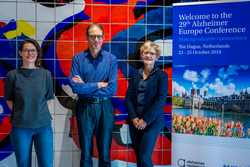 This Special Symposium, which was sponsored by a grant from Gates Ventures, was chaired by Angela Bradshaw of Alzheimer Europe. Focused on the topic of data sharing, the Symposium aimed to provide a broad overview of the state-of-the art on health data sharing, from clinical research to data protection and, finally, the views of patients. This Special Symposium, which was sponsored by a grant from Gates Ventures, was chaired by Angela Bradshaw of Alzheimer Europe. Focused on the topic of data sharing, the Symposium aimed to provide a broad overview of the state-of-the art on health data sharing, from clinical research to data protection and, finally, the views of patients.
First to speak in the Symposium was Pieter Jelle Visser, Associate Professor at the Alzheimer Center of Amsterdam University Medical Center. Highlighting the lack of effective drug therapies for Alzheimer’s disease, he underlined the importance of accessing large clinical datasets to speed up research. He discussed a number of recent initiatives aimed at facilitating data sharing, including Dementias Platform UK (DPUK), the Netherlands Consortium of Dementia Cohorts and the European Medical Information Framework - Alzheimer’s disease (EMIF-AD) project. He concluded his presentation by giving some examples of how data sharing has advanced our understanding of Alzheimer’s disease.
Moving on from these concrete exemplars of data sharing in clinical research, Manuela Mayrhofer of the Biobanking and Biomolecular Resources Research Infrastructure (BBMRI) focused on the legal frameworks that underpin responsible data sharing in health research. She started by outlining one of the central ambitions of the General Data Protection Regulation (GDPR): to strike a balance between the protection of individuals’ personal data, whilst also enabling the free movement of this personal data. Next, she spoke about the scope of the GDPR; who and what it affects, and how it imposes data protection obligations and responsibilities on researchers and organisations. To finish her presentation, she discussed some recent data scandals, outlining how the EU are handling these situations to ensure our data is held, processed and shared securely.
Nicola Bedlington of the European Patients’ Forum (EPF) drew this Special Symposium to a close by speaking about the views of patients and the general public on data sharing. Nicola started off by presenting the work that the EPF has undertaken with their member organisations, enabling them to understand the general views of patients on the sharing of their health data. She then introduced the audience to the ‘Data Saves Lives’ initiative, a multi-stakeholder platform hosted by the EPF that aims to provide up-to-date information about health data in an accessible format. Nicola drew the Special Symposium to a close by providing a snapshot of the EPF’s various digital health projects, all of which aim to ensure a strong patients’ voice in driving change for the benefit of patients.
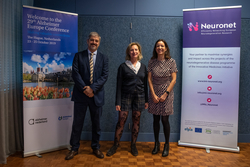 Showcasing IMI projects - Neuronet at #29AEC Showcasing IMI projects - Neuronet at #29AEC
Neuronet, a coordination and support action funded by the Innovative Medicines Initiative (IMI), brings together 15 IMI consortium projects working on neurodegenerative disease, encompassing over EUR 290 million in research funding. The Neuronet programme held four parallel sessions as part of the Alzheimer Europe conference, showcasing projects that are working to improve our understanding, diagnosis and treatment of neurodegenerative disease.
The first parallel session was chaired by Lennert Steukers from Janssen, and was entitled “European research collaboration in Alzheimer’s disease and beyond”. The three speakers in this session introduced the work of the IMI on neurodegenerative disease (Elisabetta Vaudano, IMI), presented an overview of the Neuronet project (Carlos Diaz, Synapse Research Partners) and highlighted the importance of meaningful patient and public involvement in IMI research projects (Ana Diaz, Alzheimer Europe).
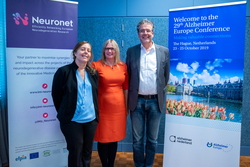 The second parallel session was chaired by Craig Ritchie, Director of the Centre for Dementia Prevention at Edinburgh University, and was entitled “From risk to dementia: Understanding disease progression and its causes”. In this session, leaders of the ADAPTED, PHAGO and AETIONOMY projects presented their work on characterising some of the key molecular drivers of Alzheimer’s disease, such as the ApoE genetic risk factor and the innate immune receptors CD33 and TREM2. The second parallel session was chaired by Craig Ritchie, Director of the Centre for Dementia Prevention at Edinburgh University, and was entitled “From risk to dementia: Understanding disease progression and its causes”. In this session, leaders of the ADAPTED, PHAGO and AETIONOMY projects presented their work on characterising some of the key molecular drivers of Alzheimer’s disease, such as the ApoE genetic risk factor and the innate immune receptors CD33 and TREM2.
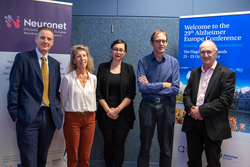 The third parallel session was chaired by Jacoline Bouvy of NICE and was entitled “Improving data access and the development of predictive models”. Four IMI projects were presented in this session: EQIPD, EMIF, ROADMAP and IM2PACT. The EQIPD project is developing a framework for improving research quality, aiming to improve the drug development pipeline, while the EMIF and ROADMAP projects showcased the new platforms and tools they have developed to help researchers visualise and access clinical research data and real-world evidence. This session finished with a presentation on the IM2PACT project, which is working to understand the blood-brain-barrier in health and disease. The third parallel session was chaired by Jacoline Bouvy of NICE and was entitled “Improving data access and the development of predictive models”. Four IMI projects were presented in this session: EQIPD, EMIF, ROADMAP and IM2PACT. The EQIPD project is developing a framework for improving research quality, aiming to improve the drug development pipeline, while the EMIF and ROADMAP projects showcased the new platforms and tools they have developed to help researchers visualise and access clinical research data and real-world evidence. This session finished with a presentation on the IM2PACT project, which is working to understand the blood-brain-barrier in health and disease.
The fourth Neuronet session was chaired by José Luis Molinuevo, Neuronet Scientific Coordination Board member, and was entitled “Diagnosis, patient engagement and trials”. AMYPAD and EPAD, two sister projects of the IMI neurodegeneration portfolio, highlighted their achievements in using amyloid-PET 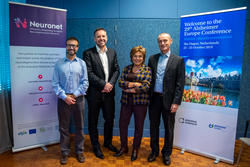 scans to diagnose AD (AMYPAD), and in creating clinical trial registries and cohorts of people at risk of developing Alzheimer’s dementia (EPAD). The leader of the MOPEAD project then presented the four patient engagement models that they are currently testing, aiming to improve early patient engagement in clinical trials. The final Neuronet session was brought to a close with a presentation on the RADAR-AD project, which is exploring how digital technologies can be used non-invasively to measure the progression of disability associated with AD. scans to diagnose AD (AMYPAD), and in creating clinical trial registries and cohorts of people at risk of developing Alzheimer’s dementia (EPAD). The leader of the MOPEAD project then presented the four patient engagement models that they are currently testing, aiming to improve early patient engagement in clinical trials. The final Neuronet session was brought to a close with a presentation on the RADAR-AD project, which is exploring how digital technologies can be used non-invasively to measure the progression of disability associated with AD.
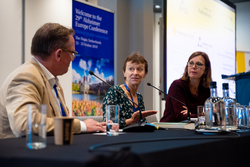
Conference co-host Alzheimer Nederland holds three special symposia
Alzheimer Nederland, co-host of the 29th Alzheimer Europe Conference, held three special symposia, during the event, the first of which, “Alzheimer Café on hospital care and dementia”, was held on 24 October from 12.15-13.45. In a special edition of an Alzheimer Cafe, the famous writer Nicci Gerrard was interviewed about her latest book, “What Dementia Teaches Us about Love”. The book gained a lot of awareness in the media and among the general public.
After her own father dying from dementia, she set out to explore the illness. Her book is an attempt to understand and is filled with stories, both moving and optimistic, from people living with dementia to those planning for the end of life, from the scientists unlocking the mysteries of the brain to the therapists using art and music to enrich the lives of affected people; from the campaigners battling for greater compassion in care to the families trying to make sense of dementia. The book explores memory, language, identity, ageing and the notion of what it truly means to care.
After the interview delegates were invited to participate in a lively discussion and to ask questions.
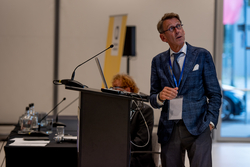 The second Alzheimer Nederland symposium focused on the Netherlands’ national dementia strategy, the “Deltaplan Dementie”. It was held on 24 October from 17.45-19.00 and speakers at the session were Philip Scheltens (Deltaplan Dementie), Marianne De Visser (ZonMW Program Committee), Dinant Bekkenkamp (Alzheimer Nederland) and Karlijn Kwint (Vilans). All four speakers are closely involved in the implementation of the Deltaplan. The second Alzheimer Nederland symposium focused on the Netherlands’ national dementia strategy, the “Deltaplan Dementie”. It was held on 24 October from 17.45-19.00 and speakers at the session were Philip Scheltens (Deltaplan Dementie), Marianne De Visser (ZonMW Program Committee), Dinant Bekkenkamp (Alzheimer Nederland) and Karlijn Kwint (Vilans). All four speakers are closely involved in the implementation of the Deltaplan.
The Deltaplan was launched in 2012, to address and manage the growing problem of dementia in the Netherlands. This second national strategy was launched by the Ministry of Health, Welfare and Sports and comes to an end next year. It relies on three main pillars, focussing on, respectively: Scientific research (basic research, prevention, finding a cure for dementia, research with a focus on treatment, support and quality-of-life); improving care; and creating a dementia-friendly society. The plan has a dedicated budget of around EUR 90 million, financed by the government and by private organisations.
The Deltaplan Dementie is also a cooperative network with member organisations in the fields of science, education, healthcare, healthcare insurance and business, as well as patient organisations.
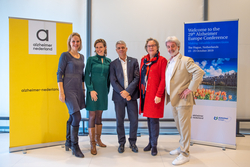 The third and final symposium organised by Alzheimer Nederland, “Innovations in dementia care in the Netherlands”, was held on 25 October from 12.15-13.45. Speakers at the session were Bere Miesen (The Hague), Bernadette Willemse (Reigershoeve), Simone De Bruin (RIVM – Netherlands National Institute for Public Health and the Environment) and Willem Draaisma (Participe). The third and final symposium organised by Alzheimer Nederland, “Innovations in dementia care in the Netherlands”, was held on 25 October from 12.15-13.45. Speakers at the session were Bere Miesen (The Hague), Bernadette Willemse (Reigershoeve), Simone De Bruin (RIVM – Netherlands National Institute for Public Health and the Environment) and Willem Draaisma (Participe).
One of the Dutch innovations examined during this session was the concept of the “Alzheimer Cafe”, presented by Bere Miesen, the ”founding father” of these Cafes. New developments in small-scale housing and care farms as an alternative to regular daycare and nursing home facilities were also presented. Small-scale housing is now used in many nursing facilities. Care farms are a more recent addition, with some promising initiatives ongoing, both in the Netherlands and internationally.
Since innovation can also mean expanding on ideas from other countries, the final speaker examined how the Danish concept of “Odensehuizen” was picked up and developed into a new facility in the Netherlands.
Poster awards
The Alzheimer Europe Foundation has awarded a prize to the top two poster presentations for today, as voted by conference participants. The winner will be awarded EUR 750 and the runner-up gets EUR 250.
The two winners for today were Marjolein Scholten for PO17.3. Marjolein Scholten (Netherlands): Green Care Farms, a new old housing concept? (runner-up) and Monika Wilhelmi for PO9.5. Monika Wilhelmi (Germany): Hands-on Dementia. The interactive way to understand dementia. A method to feel the symptoms of dementia (first place).
Congratulations to both of them!
Alzheimer Europe would like to thank to all delegates who joined us at #29AEC, and wish everyone a safe trip home. See you next year for #30AEC!
For further information, contact:
Jean Georges, Executive Director of Alzheimer Europe, 14, rue Dicks, L-1417 Luxembourg, Tel.: +352-29 79 70, Fax: +352-29 79 72, jean.georges@alzheimer-europe.org
Notes to editors:
Alzheimer Europe is the umbrella organisation of national Alzheimer associations and currently has 42 member organisations in 37 European countries. (www.alzheimer-europe.org).
The NEURONET initiative (Efficiently Networking European Neurodegeneration Research) is a three-year coordination and support action aiming to set up an efficient platform to boost synergy and collaboration across the Innovative Medicines Initiative (IMI) projects in the Neurodegenerative Disorders (ND) portfolio. Neuronet has received funding from the IMI 2 Joint Undertaking under grant agreement No 821513. The JU receives support from the European Union’s Horizon 2020 research and innovation programme and EFPIA and Parkinson’s UK. (www.imi-neuronet.org)
Alzheimer Nederland (founded in 1984) has approximately 100 employees at its head office in Amersfoort and 3,500 volunteers across the country, providing information about dementia, offering support and promoting better care for people with dementia. Alzheimer Nederland works closely with regional and national healthcare institutions and raises money for, among other things, scientific research into dementia. (www.alzheimer-nederland.nl)
|